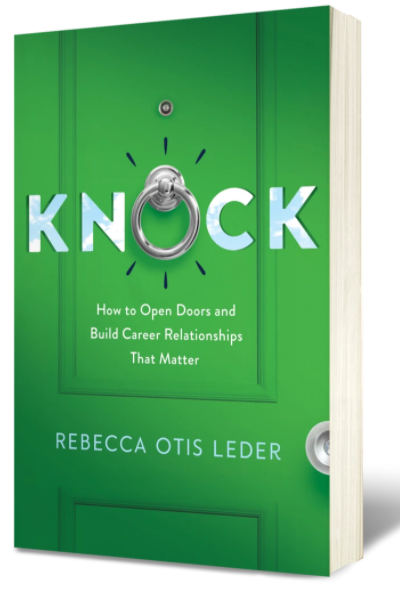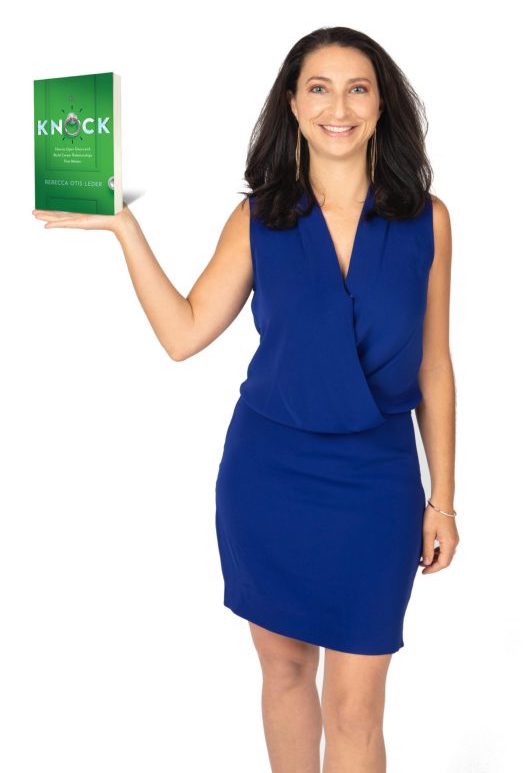The message of Rebecca Otis Leder’s Knock: being human in business pays off

You might think there is no one right way to behave in business. But it turns out, that’s wrong. There really is one right way. There are just a million ways to express it.
That’s the message of Knock: How to Open Doors and Build Career Relationships That Matter, the new book by Rebecca Otis Leder.
Five steps to business relationships that last
Like everyone else, I had to figure out how relationships in business worked by trial-and-error. And I had a handicap. I was a mathematical prodigy, so it was clear to me that I was smarter than everyone else, and I didn’t try to hide it.
As a method for interacting at work, that turned out poorly — at least until I figured out how to relate to the other people I worked with as human beings.
Of course, what I did is not the only way to screw up. You can approach every interaction with others as a transaction or a negotiation. You can form alliances and treat work as Game of Thrones. You can wallow in imposter syndrome, certain that you don’t belong there at all.
As Leo Tolstoy wrote in Anna Karenina: “Happy families are all alike; every unhappy family is unhappy in its own way.” Similarly, people who are effective in business in the long term all share traits, while those who end up on the outs fail in many different ways.
But what are those traits? At the tail end of my career, I started to believe I have finally developed a feel for them, but can they be taught?
Knock is the book that teaches those traits — and there is of course, an acronym for the steps that spells “knock.” The parts in bold in the list below are quoted directly from the book.
- Know my topic, my contact, and my specifics up front. Prepare to connect. This includes both researching someone before contacting them and identifying specifics that will help make the connection.
- Not about me. Focus on my contacts, us, and our mutual impact. Center your outreach around others, rather than yourself, and on maximizing the impact of your connection.
- Own it. Be personal and authentic; invest in the relationship and the cause up front. In other words, don’t be fake or shallow.
- Commonality. Build trust to open the door. Find things you share as a way to connect.
- Keep giving. Help others, and practice generosity and gratitude. This isn’t a one-and-done thing.
This may sound like a networking book. It’s not — or more accurately, it’s a lot more. It’s an owner’s manual for using your brain at work.
Being generous
We are all busy. But we all need help. If you take more than you give, you’ll find that people aren’t there for you when you need their help.
This philosophy of giving first — and putting in the effort ahead of the connection — is essential in a world where every connection is instant. There is no excuse for failing to research people ahead of time, for failing to identify what you have in common, or for starting any relationship without an inclination to help. It’s not just an investment in the world. It’s an investment in your future, one that will pay off when you need it most.
If you wonder how to do this, the book is filled with stories, research, and advice that will help you out. It’s worth your time.
My role

I coached Rebecca on writing and edited her text. But that’s not why you’re reading this. I edit a lot of books; most of them don’t get featured in this space. Rebecca is completely responsible for the value delivered in this book.
You’re reading this because I am convinced that Rebecca is destined for big things, and this book proves it.
People ask me for help all the time. I ask people for help all the time. Now the best way to do that is written down in a clear, simple, and entertaining book.
Don’t just read this book. Do what it says. The more of us who do that, the better off we’ll all be.